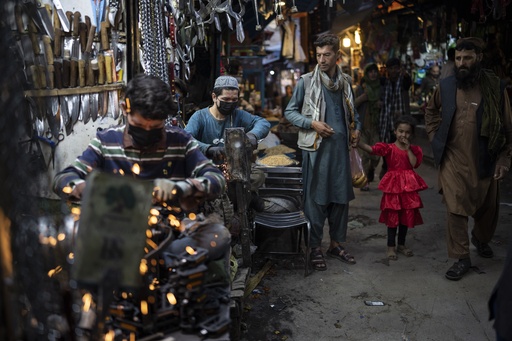Afghanistan’s economy is beginning to show slight signs of recovery following two years of significant decline, according to a recent report from the World Bank.
In their latest development update released on Wednesday, the institution reported a modest GDP growth of 2.7%, primarily fueled by an increase in private consumption. This partial rebound, along with decreasing food prices, has contributed to a gradual enhancement of household living conditions.
Prior to the Taliban’s resurgence in August 2021, Afghanistan’s economy was heavily dependent on foreign aid, with widespread corruption prevalent. The Taliban’s takeover three years ago triggered a dramatic economic downturn, as billions in international funding were halted and many skilled Afghans fled the country, taking their financial resources with them.
Afghanistan’s exports maintained a steady pace in 2023-2024, but there was a notable rise in imports, leading to an expanding trade deficit, according to the World Bank. This deficit, worsened by the country’s reliance on foreign goods for essential items such as fuel, food, and machinery, poses a significant threat to economic stability.
Faris Hadad-Zervos, the World Bank’s country director for Afghanistan, emphasized that the country’s long-term growth hinges on harnessing the considerable potential of its domestic private sector and enhancing the overall business landscape.
“Crucial to this effort is increased investment, ensuring access to financing for small businesses, and fostering educated and skilled women entrepreneurs, enabling their enterprises to prosper,” Hadad-Zervos explained. “Failure to achieve this may result in prolonged stagnation and limited chances for sustainable development.”
This economic update follows recent media reports indicating that the Taliban have directed educational institutions to cease offering medical training to women and girls. The Taliban has not confirmed these reports nor provided any public comments regarding the matter.
On Thursday, the head of UNICEF, the United Nations children’s agency, expressed significant concern over these reported restrictions. UNICEF is currently working to verify the accuracy of these conflicting accounts and is supportive of initiatives aimed at addressing the situation, stated the agency’s executive director, Catherine Russell.
If these reports are verified, it is expected that this ban would halt the medical education of thousands of women, potentially jeopardizing the healthcare access for women and girls. Russell highlighted that this prohibition would not only further curtail women’s capacity to contribute to society or earn an income but would also result in dire consequences for the overall health of the Afghan population, warning, “Lives would be lost.”
Home World Bank reports slight growth in Afghan economy, but recovery is still...


